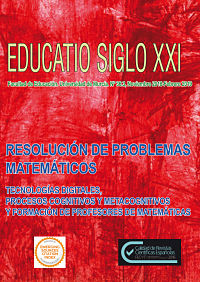Teacher practice: The teaching of fractions in a primary classroom through problem situations
Abstract
This document seeks to identify the elements in teachers’ practice that allow generating a discussion in the classroom about the concept of fraction and provide learning opportunities to students. To this end, we start from two situations-problems generated by the teacher, one of them is the introduction of the concept and in the other, which corresponds to a later stage of the teaching-learning process, the students have to handle the concepts learned. The research methodology used is qualitative, since it is based on a case study. The data were collected by recording two classroom sessions and the Knowledge Quartet (KQ) was used as a methodological framework, emphasizing its four dimensions: foundation, transformation, connection and contingency. Learning opportunities vary from one task to another. The first one, on being an introductory activity, is more related to connection, while, in the second, foundation and transformation have more weight. However, in both, contingency emerges as a key aspect to delve into the understanding of the concepts.
Downloads
-
Abstract1848
-
PDF (Español (España))933
References
Behr, M., Harel, G., Post, T. & Lesh, R. (1992). Rational number, ratio and proportion. En D. A. Grouws (Ed.) Handbook of Research on Mathematics Teaching and Learning (pp. 233–296). New York: MacMillan Publishing Company.
Bishop, A., & Goffree, F. (1986). Classroom organization and dynamics. In B. Christiansen, A. G. Howson, & M. Otte (Eds.), Perspectives on mathematics education (pp. 309–365). Dordrecht: Reidel.
Bogdan, R., & Biklen, S. K. (1994). Investigação qualitativa em educação: Uma introdução à teoria e aos métodos. Porto: Porto Editora.
Hiebert, J. & Grouws, D. (2007) The effects of classroom mathematics teaching on students’ learning. En F. Lester (Ed.). Handbook of Research on Mathematics Teaching and Learning (pp. 371-404). NCTM: Information Age Publishing.
Kieren, T. E. (1976). On the mathematical, cognitive and instructional foundations of rational numbers. En R. Lesh (Ed.), Number and measurement: Papers from a research workshop (pp. 101–144). Columbus, OH: ERIC/SMEAC.
Llinares, S. (2013). Professional noticing: A component of mathematics teacher’s professional practice. Sisyphus, 1(3), 76-93.
Monteiro, C. & Pinto, H. (2006). A aprendizagem dos números racionais. Quadrante, 14(1), 89-108.
Pecharroman, C. (2014). El aprendizaje y la comprensión de los conceptos matemáticos desde una perspectiva ontológica. Educación matemática, 26(2), 111-133.
Piñón, M. (1995). Las fracciones en la escuela. Pedagogía, 10(5), 58-65.
Ponte, J. P. (1995). Perspectivas de desenvolvimento profissional de professores de Matemática. In J. P. Ponte, C. Monteiro, M. Maia, L. Serrazina, & C. Loureiro (Eds.), Desenvolvimento profissional de professores de Matemática: Que formação? (pp. 193-211). Lisboa: SEM-SPCE
Ponte, J. P. (2005). Gestão curricular em Matemática. In GTI (Ed.), O professor e o desenvolvimento curricular (pp. 11–34). Lisboa: APM.
Ponte, J.O. y Quaresma, M. (2016) Teachers’ professional practice conducting mathematical discussion. Educational Studies in mathematics, 93(1), 51-66.
Rowland, T., Huckstep, P. y Thwaites, A. (2005) Elementary teachers’ mathematics knowledge: the knowledge Quartet and the case of Naomi. Journal of Mathematics Teacher Education, 8, 255-281.
Rowland, T. (2005). The Knowledge Quartet: a tool for developing mathematics teaching. Proceedings of the Forth Mediterranean Conference on Mathematics Education, 28, 29, 30. January, Palermo, pp.69–81.
Rowland, T., Huckstep, P. e Thwaites, A. (2011) Secondary mathematics teachers’ content knowledge: the case of Heidi. Paper given at CERME7, pp. 2817-2837. Rzeszów, Poland.
Ruthven, K., Hofmann, R., & Mercer, N. (2011). A dialogic approach to plenary problem synthesis. In B. Ubuz (Ed.), Proceedings of the 35th Conference of the International Group for the Psychology of Mathematics Education (Vol. 4, pp. 81–88). Ankara, Turkey: PME.
Sherin, M. G. (2002). A balancing act: Developing a discourse community in the mathematics classroom. Journal of Mathematics Teacher Education, 5, 205–233.
Shulman, L. S. (1986). Those who understand: knowledge growth in teaching. Educational Research, 15(2), 4-14.
Stein, M. K., Engle, R. A., Smith, M., & Hughes, E. K. (2008). Orchestrating productive mathematical discussions: Five practices for helping teachers move beyond show and tell. Mathematical Thinking and Learning, 10, 313–340.
Original work publishes in this journal is subject to the following terms:
1. Murcia University Press (the publishing house) holds the copyright of the publishes work, and favours and allows their reutilization under the use license stated in point 2.
© Servicio de Publicaciones, Universidad de Murcia, 2015
2. Work is published in the electronic edition under a license (Creative Commons Reconocimiento-NoComercial-SinObraDerivada 4.0 España (legal text). They can be copied, used, disseminated, transmitted and publicly presented, as long as: i) authorship and original publication source is acknowledged (journal, publishing house and URL of the work); ii) are not used for commercial purposes; iii) the existence and specifications of this use license is stated.
3. Conditions for self-archive. Authors are allowed and encouraged to disseminate electronically the pre-pint (before review) and/or post-print (accepted for publication) versions of their work before their publication since that favours earlier circulation and dissemination resulting in an increased chance for the authors to be cited and for the work to reach a bigger share of the academic community. Colour: RoMEO: green.








